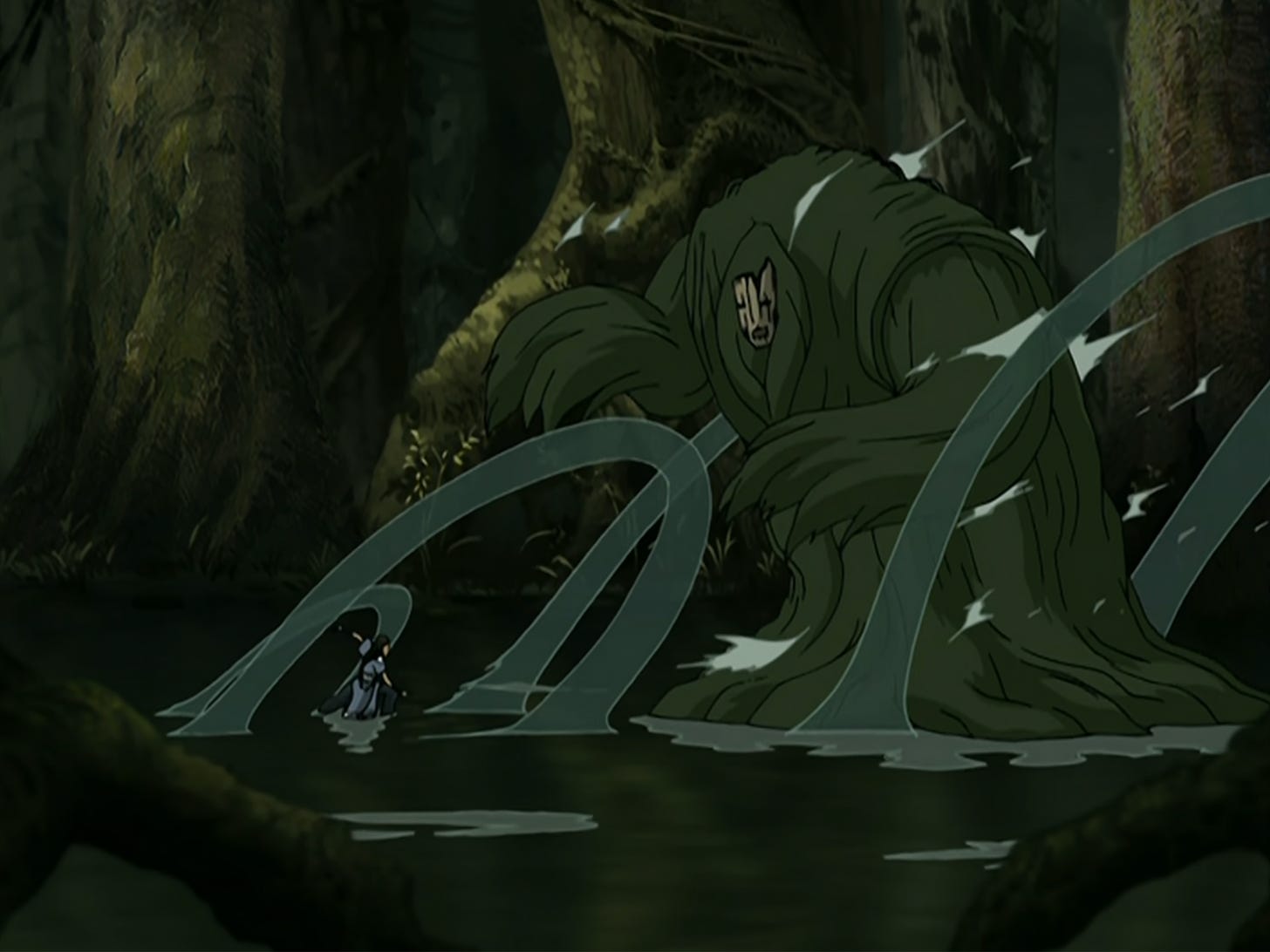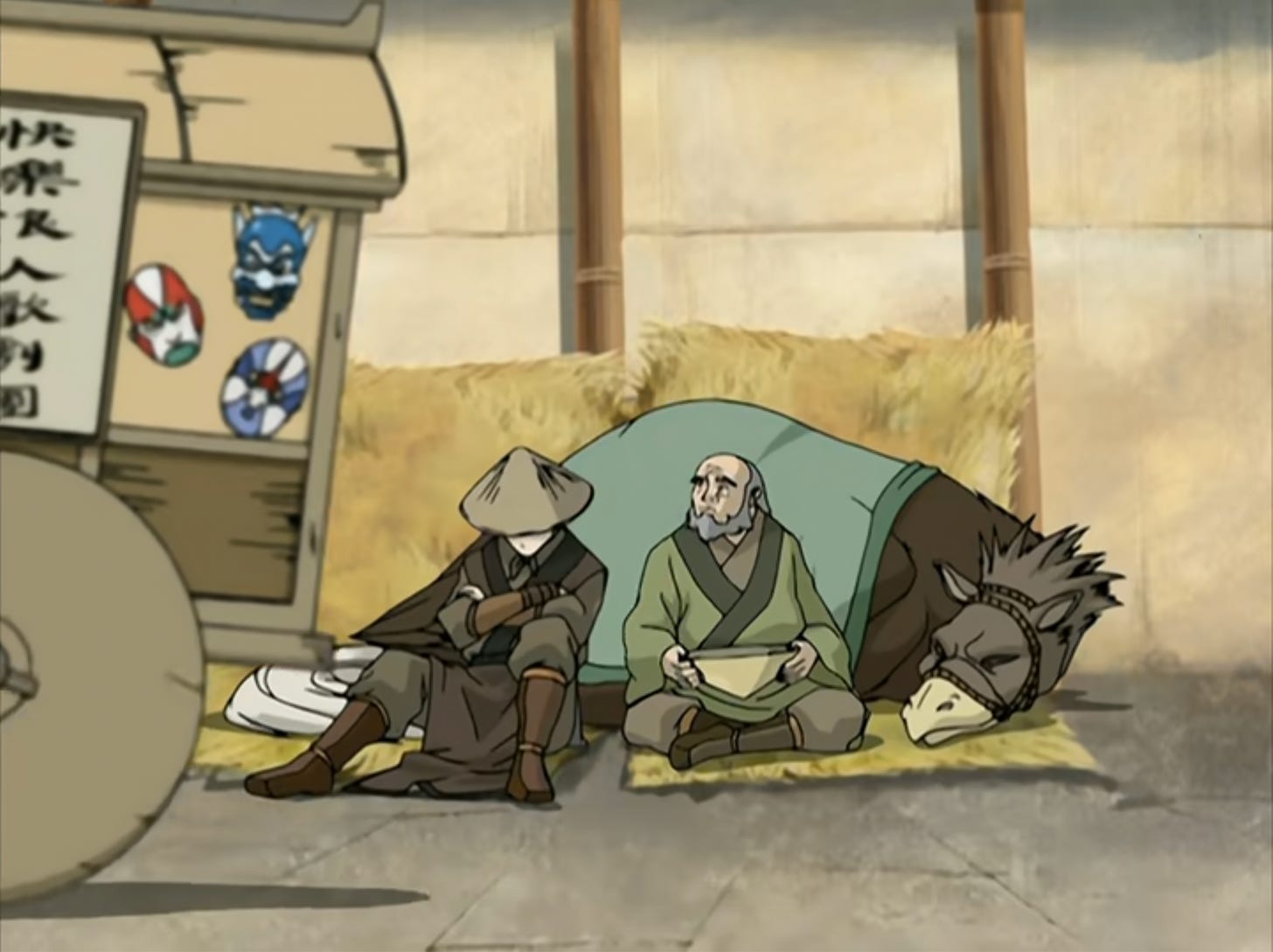Thanks for tuning in to my twenty-fourth of 61 daily reviews of Avatar: The Last Airbender! Yesterday, we watched S2E3: Return to Omashu.
Team Avatar gets stranded in a massive swamp in this episode, which feels like it’s mostly killing time in these early episodes of Season 2. The marshland seems to have some mystical powers, though Sokka refuses to believe it. Aang has a sense that the swamp is calling to him, and then a tornado spontaneously appears to suck in and scatter the Gaang.
The animators do a good job of bringing the swamp to life as one of the more unique settings in Avatar. It’s got a plethora of odd creatures (elbow leech, super firefly, screaming little bird, catfish gator) and its own cast of peculiar characters. The swamp has its own tribe of waterbenders, like Tho and Due, who wear loincloths and giant leaves for hats while they hunt Appa and Momo on bending-powered canoes. In their character design, the Mekong meets the bayou: their names and the setting seem to be loosely Vietnamese-inspired, but their accents and mannerisms have a distinct Cajun flair.
“Now what would a lemoo need a shirt fer?”
There’s also Huu (pronounced like Hugh), an enlightened waterbending master who bends the water inside the vines, animating a giant swamp monster around his body as frightening avatar. He attacks the Gaang to protect his home from Sokka, who is really not feeling it and tries to hack and slash every branch and vine in sight. Huu’s character is a pretty cool concept, but his battle with Team Avatar feels pretty incongruous. If he’s a good guy, why does he fight for so long instead of asking questions? And why do Aang, Katara and Sokka all just trust him immediately?
Huu leads them to the trunk of the great banyan-grove tree, an ancient, monumental tree whose roots spread out across the entire swamp. He gives a little speech about how the divisions between people are just social constructions.
We're all living together, even if most folks don't act like it. We all have the same roots and we are all branches of the same tree.
The message is in line with Avatar’s philosophy, but without any major divisions in this episode, his words lack immediacy. And things get a little New Agey when he says that “time is an illusion and so is death.” But hey, he’s enlightened! More importantly, he teaches our heroes the meanings of their visions in the swamp. Katara’s mother and Princess Yue may be gone, but their connection to Katara and Sokka is not. And Aang’s vision of the laughing girl with the flying boar is someone he’s going to meet. Who could it be?
In the brief B-plot, Zuko and Iroh have been reduced to begging in an Earth Kingdom town. Iroh is smiling and unflappable as ever, even when a local swordsman cruelly demeans him and then leaves a gold coin. Does Iroh really think the swordsman is nice, or is he just trying to teach his nephew a lesson in stoicism? Either way, Zuko is humiliated. He revives his Blue Spirit alter ego to rob the guy. Is it justified?
See you tomorrow for Episode 5: Avatar Day! Share your own thoughts on this episode in the comments.
Spare observations
“You think everything tastes like possum chicken.”
At the beginning of the episode, you can see a mask merchant’s cart roll by, and he’s selling the Blue Spirit mask. Take a look at the picture above. It’s a minor detail, but important for continuity (which Avatar pays a lot of attention to), since Zuko would have lost the original mask when the pirates blew up his ship. Where he got the swords, I couldn’t tell you.
Momo throws the same tiara at the swamp benders that he brought her in The Blue Spirit.
Katara sends razor-thin and razor-sharp blades of water at Huu’s swamp monster. It’s a more powerful version of her attack in her showdown with Pakku.
Friends of the White Lotus [SPOILERS]
Guess what, we’re foreshadowing the arrival of Toph again. It’s reaching levels of subtlety that shouldn’t even be possible.
Huu’s ability to bend vines is another case of benders creatively finding their elements in unusual places that I first called out in Imprisoned.






